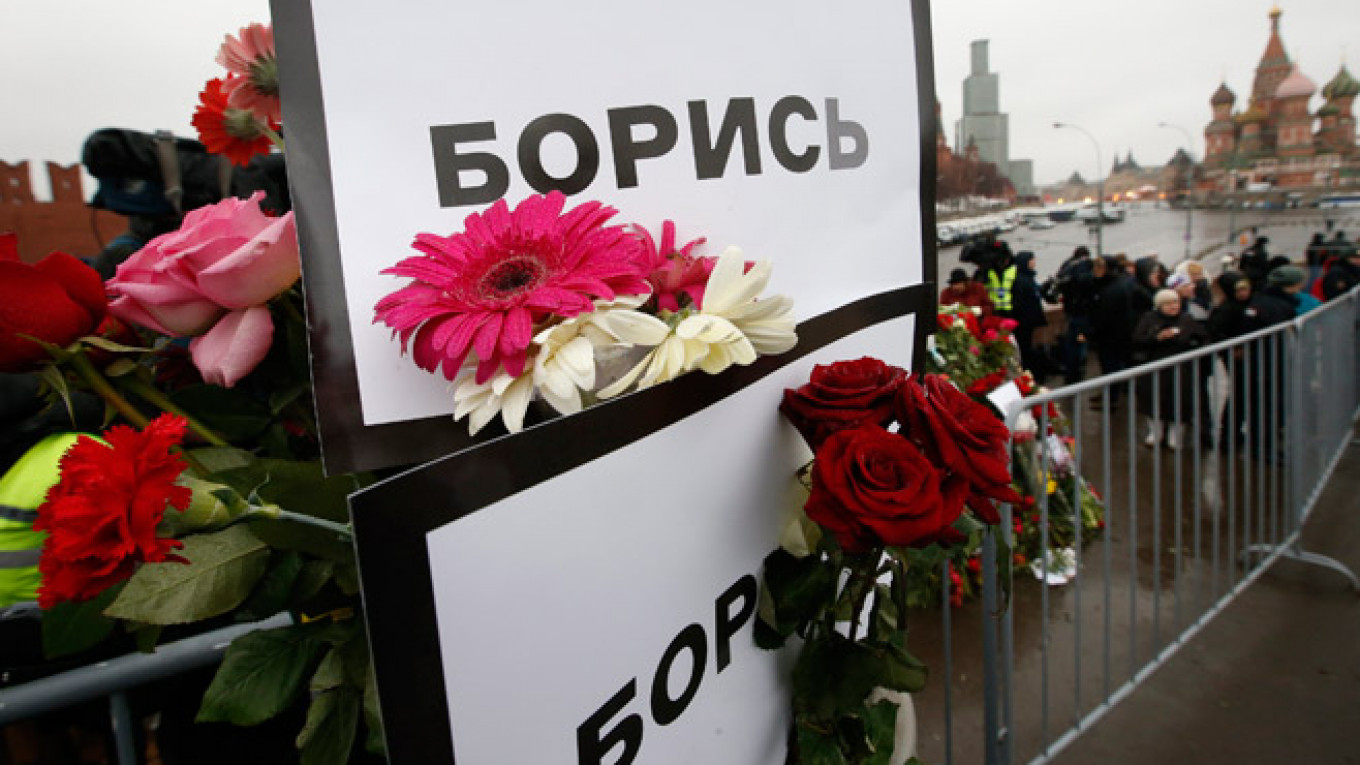?‘???€??́????!: Fight on!
After the assassination of Boris Nemtsov and the days of mourning and horror that followed it, it's hard to find my usual joy in the Russian language and its constant, fascinating evolution. Perhaps this is because its evolution is being slowed, or thrown back in places, by the re-emergence of Soviet-era words, phrases and concepts.
In the new category, we've got the word ?????€?‹???·???‚?? — to steal, especially land or territory — derived from the word ???€?‹?? (Crimea). I guess this is something like "to pull a Crimea": ???‚?? ?¶ ???‚???°?¶?µ?‚???? ?????€?‹???·???‚?? ?????????? ?‚?µ?€?€???‚???€???? ???€?? ???»???‡?°?µ. (Who would turn down the chance to pull a Crimea and grab a piece of land.)
?????€?‹???·???‚?? is used in other contexts, too, as a modern replacement for ?????????????????·?????‚?? (to make off with something, the way communists expropriated private property). ?????????° ???°?‡?°?»???????? ?? ???????°???????€???????µ, ?µ???? ?????‚?€???????????? ???‚?°?€?°???‚???? ?‡?‚??-?????±?????? ?????€?‹???·???‚??. (When the boss is away on business, his employees try to rip off something.)
And in the revived old category, there's ???€?????????°?†???? (provocation), which is making such a comeback that it's shooting off the top of the Google Ngram chart. ???€?????????°?†???? has several meanings. It can be simply the act of provoking or inciting someone to do something. For example, on the eve of Hitler's attack on the U.S.S.R., General Zhukov sent an order to the front lines: ?—?°???°?‡?° ???°?????… ?????????? — ?????·???µ?€?¶?°?‚?????? ???‚ ???°?????… ?±?‹ ?‚?? ???? ?±?‹?»?? ???µ?????‚??????, ?????‚???€?‹?µ ?????¶???? ?????‚???»???????°?‚?? ???°?? ???€?????????°?†????. (The task of our troops is to refrain from any action that might be perceived as a provocation.)
But ???€?????????°?†???? has another very special meaning in the Russian political lexicon: ???€?????????°?†???? is an act committed by one party to make it look like it was done by another party. For example, President Vladimir Putin's spokesman Dmitry Peskov said about Nemtsov's murder: ???? ???‚?????€???†?µ???‚?????? ?????µ?€?µ?????????‚???? ?????¶???? ?????????€???‚?? ?? ?‚????, ?‡?‚?? ???‚?? ???€?????????°?†???? (I can say with 100 percent certainty that it's a provocation). That is, Nemtsov was murdered by — pick your demon — the United States, Ukraine, or a fellow Russian oppositionist in order to make it look like someone in the Russian government did it.
And then there is ???€?????????°?†???? usage that I find so insane that I can't actually figure out what it means. Recently a deputy in the Federation Council said the horrific fire at the Institute for Scientific Information on Social Sciences "?????? ?±?‹?‚?? ???€?????????°?†???µ?? ?? ?†?µ?»???? ???????°?·???‚?? ?????‚???€???‡?µ???????µ ?„?°???‚?‹" (might have been a provocation that had the goal of distorting historical facts). In what sense could a fire be a provocation? In what universe does that make any sense? I'll pass on that one.
Use of the phrase ?????‚?°?? ?????»???????° (the fifth column, i.e., a group that undermines a nation/army/structure from within) peaked during the Great Patriotic War. After decades of dormancy, usage has picked up. Now in some political circles, ?????‚?°?? ?????»???????°, ???€?µ???°?‚?µ?»?? (traitor), and ?????????·???†???? (opposition) are synonyms.
Another word making a big come back is ?±???€???‚?????? (to fight, battle, struggle). ?‘???€???‚?????? is what the government is doing against those fifth columnists — fighting them down. And ?±???€???‚?????? is what the opposition is doing in response — resisting, fighting back.
The most touching sign at the march in memory of Boris Nemtsov was ?±???€?????? (fight on!), the imperative form of the verb ?±???€???‚??????, which but for a soft sign is the name of the man people had come to honor and mourn — a small gift from the Russian language on a day of great sorrow.
Michele A. Berdy, a Moscow-based translator and interpreter, is author of "The Russian Word's Worth" (Glas), a collection of her columns.


